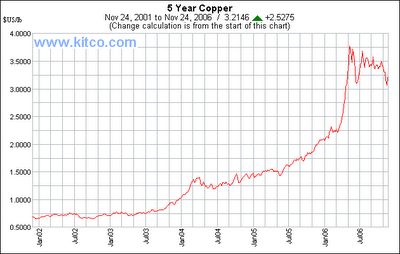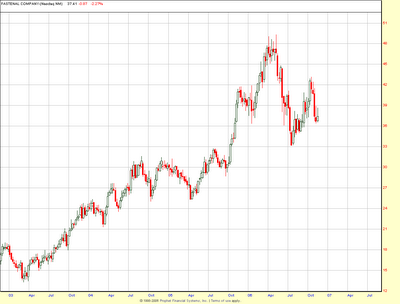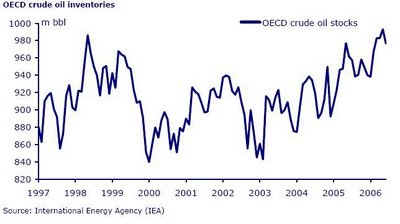What Ever Happened To Anti-Competitive and Antitrust Laws?
-John Kenneth Galbraith
Not long ago I saw an interview with Jack Welch, former CEO of GE, where he opined about Wal-mart's push into the north east U.S. He shared a conversation he had with a union worker at a local grocery chain. The worker told Welch that his management was concerned they would have to fire workers and reduce salaries if Wal-mart's push was successful. Welch's response was something on the order of "So you are charging the customer too much?". In other words, if you can afford to lower labor costs, you are currently charging the customer too much and are obligated to cut wages as he went on to say. Now, if you are a feudal lord or Jack Welch, then I guess that's a reasonable statement to make. But, if you are a working person and need to provide for your family like 98% of people, wages for the masses actually matter.
Let me digress a few moments here to make a few off topic comments. I didn't see Jack worried too much about lowering GE's costs as it pertained to his bloated salary. Nor did he seem to care about GE customers paying too much when he retired from GE and continued to receive an extremely piggish compensation package that would make the Queen of England blush. I guess those who are enlightened recuse themselves from the rules for the minions they govern. Similarly, I once had a client who constantly complained that the union was keeping them from lowering wages to compete with Wal-mart. His salary was over $4 million annually. Nothing wrong with sitting sideways on your wallet. Something wrong with not wanting others in your organization to make a decent living when you are living the high life. I am not endorsing unions either. I'm simply pointing out the lack of empathy and economic disparity which appears to be developing in the U.S. This general topic fits into the reason for my post.
Typically, I'm of the opinion any massively large organization has a disproportionate and undesirable amount of control. This includes bloated government. Over the last thirty years we've seen the growth and domination of mega companies with the relaxation of antitrust regulation started under the Reagan administration.
I feel extremely fortunate to live in a democratic society. But, capitalism is not democracy. Nor do most companies practice anything similar to a democratic process in their hierarchy or organizational structure. That's too bad because they aren't maximizing their most important asset: the intellectual capital of their employees. To be fair, some actually embrace employee empowered cultures where managers act more as coaches or facilitators than the next Napoleon and constructive conflict is encouraged. But, then those are typically the companies which have the lowest turnover and strong environments of innovation, customer service and great employee moral. The reality is working for many companies is more like being a serf working for a medieval lord rather than anything close to democratic ideals. Capitalism is the best form of economic system available today but it is not perfect by any means. Nor is there a particular definition of what type of capitalism works best. Asian, European and American cultures each represent different interpretations of capitalism. As an example, while many in America may eschew European capitalism, the reality is the American engine of growth has more to do with a liberal immigration policy and continued population growth than most other variables.
Where am I going with this? San Diego just banned big box retailers which meet certain criteria. This attempted ban is targeted specifically at Wal-mart but will affect other mega retailers as well. There is actually a logic to their decision whether you agree or disagree with it. Most "free market" types would say San Diego has stepped out of bounds. Wal-mart or anyone else has the right to do whatever they want within the rule of law and the markets will pick the winner. Or, they'd cite that Wal-mart usually gets thousands of resumes for every new store opening. ie, If Wal-mart was negatively impacting the economy, why do so many people want to work there?
I generally agree with those statements although I'm not sure it's quite so clear as to who is on the right side of the law in this situation. There is no doubt there has become a great concentration of power in the U.S. economy. We've seen this concentration of power or monopolistic/oligopolistic practices in the past. And as such, we've seen capitalism without enforcement of anti-competitive laws is not necessarily self-correcting or what is best for society as a whole. That is, unless you are GM and other monopolies come into your market with a more genteel culture. Some even argue monopolistic/oligopolistic practices contributed to the Great Depression. There is a reasonable amount of supporting evidence that such practices, common during the 20s and 30s, surely didn't help the economy. It's no coincidence the board game Monopoly was created during the Great Depression.
What's the point? I believe we are at a time where a fundamental question needs to be asked. Are societies better off with one or a handful of companies dominating massive pieces of an economy as is the case today? Are we repeating history with lax enforcement of anti-competitive laws? Are such concentrations of power that were historically destructive to the economic vitality of nations or societies still destructive over the long term?
I generally believe in a non intrusive government policies but there are times when capitalism left to its own devices creates massive imbalances. Imbalances where competition, innovation, price flexibility and ultimately employment are compromised. Robber barons dominated the early industrial age in the U.S. as they did in other societies by many names over countless centuries. Are we seeing a return of such a business climate? There is no doubt that companies which achieve massive critical mass practice predatory business practices, stifle innovation, stifle new business creation, increase price rigidity, negatively impact employment opportunities and reduce competition.
Is it time for governments to dust off their anti-competitive laws? Is the city of San Diego effectively doing just that with a federal government that has adopted a policy of laissez faire as it pertains to antitrust regulation? Will the unchecked mergers of the last three decades exacerbate any significant economic down turn as happened during the Great Depression? Time will tell. But I am sure that companies like Wal-mart can and do use their size and financial position to unfairly affect legislation, unfairly lobby their cause and if they so choose, unfairly limit competition. With consolidation in technology, communications, transportation, banking, financial services, retail and other industries, I believe an honest discussion about enforcement of anti-competitive laws is timely and worthwhile. Entrepreneurs created the miracle of capitalism and collectively society should do everything possible to level the playing field or even slant opportunity towards entrepreneurs and new enterprise creation. As I've written before, that also includes scrapping Sarbanes-Oxley for small businesses. Something the incoming Congress appears to support.















